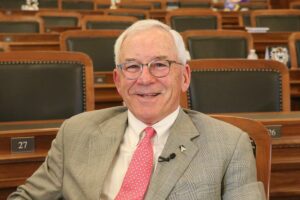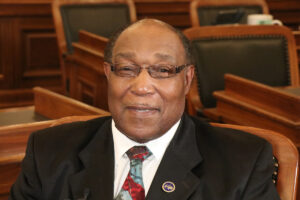Topic: Criminal justice reform

Interview of Edward (Ed) Reilly, July 2, 2019
Interviewed by Dale Goter
In his 2019 oral history interview former State Senator Ed Reilly recalls controversial issues that went through the Senate Federal and State Affairs Committee during his tenure as chair (1971-1992). Those issues include the death penalty, liquor by the drink, lottery, pari-mutuel wagering, and casino gambling, some of which required adoption of Constitutional amendments. Reilly attributes the acceptance of those cultural changes in part to the need to raise additional state revenue. Reilly recalls professional relationships with the Statehouse press corps and the influence of grass-roots interests. He observed the increase in the number of women in the Legislature and Show Morecomments about their contributions. Show Less

Interview of Mike O'Neal, April 16, 2021
Interviewed by Alan Conroy
Former Speaker Mike O'Neal's interview covers his 28 years in the Kansas House and his impact as Chair of the House Judiciary Committee on the Kansas legal system, both criminal and civil. In fact, O'Neal chaired the House Judiciary Committee three different times totaling 13 years and also served as Chairman of the House Education Committee and a redistricting committee in 2002. He has been involved with workers compensation issues and medical malpractice. O'Neal explains his own evolution in thinking as he, and his constituents, became more conservative. He candidly discusses his race for Speaker of the Show MoreHouse and compares the leadership styles of other speakers with whom he served. O'Neal left the House in 2012 after finishing his second term as Speaker to take a position with the Kansas Chamber of Commerce as its chief executive officer. After four years with the Kansas Chamber he retired to open his own legal consulting and governmental relations firm, O'Neal Consulting, LLC. Show Less

Interview of Ben Scott, January 14, 2022
Interviewed by Joan Wagnon
Ben Scott describes his life of service as an activist for schools and the community as well as his church. Scott's early experiences with segregation and racism informed his later activities as a member of the Board of Education in Topeka as the district sought to achieve racial balance in its public schools. The desegregation plans he and Sherman Parks Jr. developed in 1990's were instrumental in dismissing the federal lawsuit against the district. Scott was a leader in the Topeka and Kansas NAACP. He pointed out their priorities were finding enough Black teachers as Show Morewell as improving housing. Racial profiling was another NAACP concern that he carried to the Kansas legislature along with his concerns about student achievement and teachers having enough resources. In his interview, Scott talks candidly about racism in the juvenile justice system, racial profiling, Critical Race Theory (CRT), and the role of the church in dealing with racism. His hopes for continued legislative service were derailed by loss of election in 2016; however, he still pushes for developing standards for teaching Black history.
Highlights -- short excerpt from the interview
